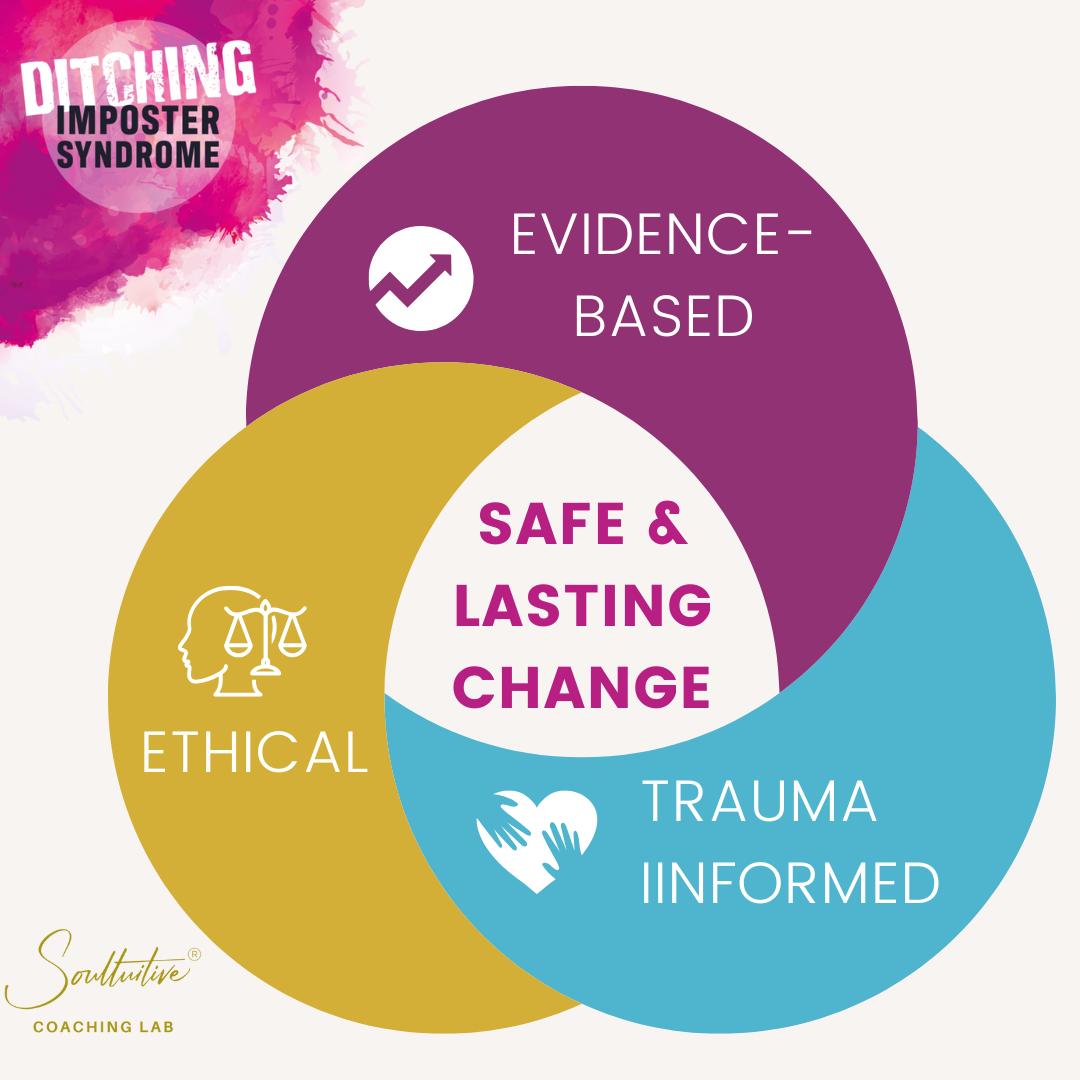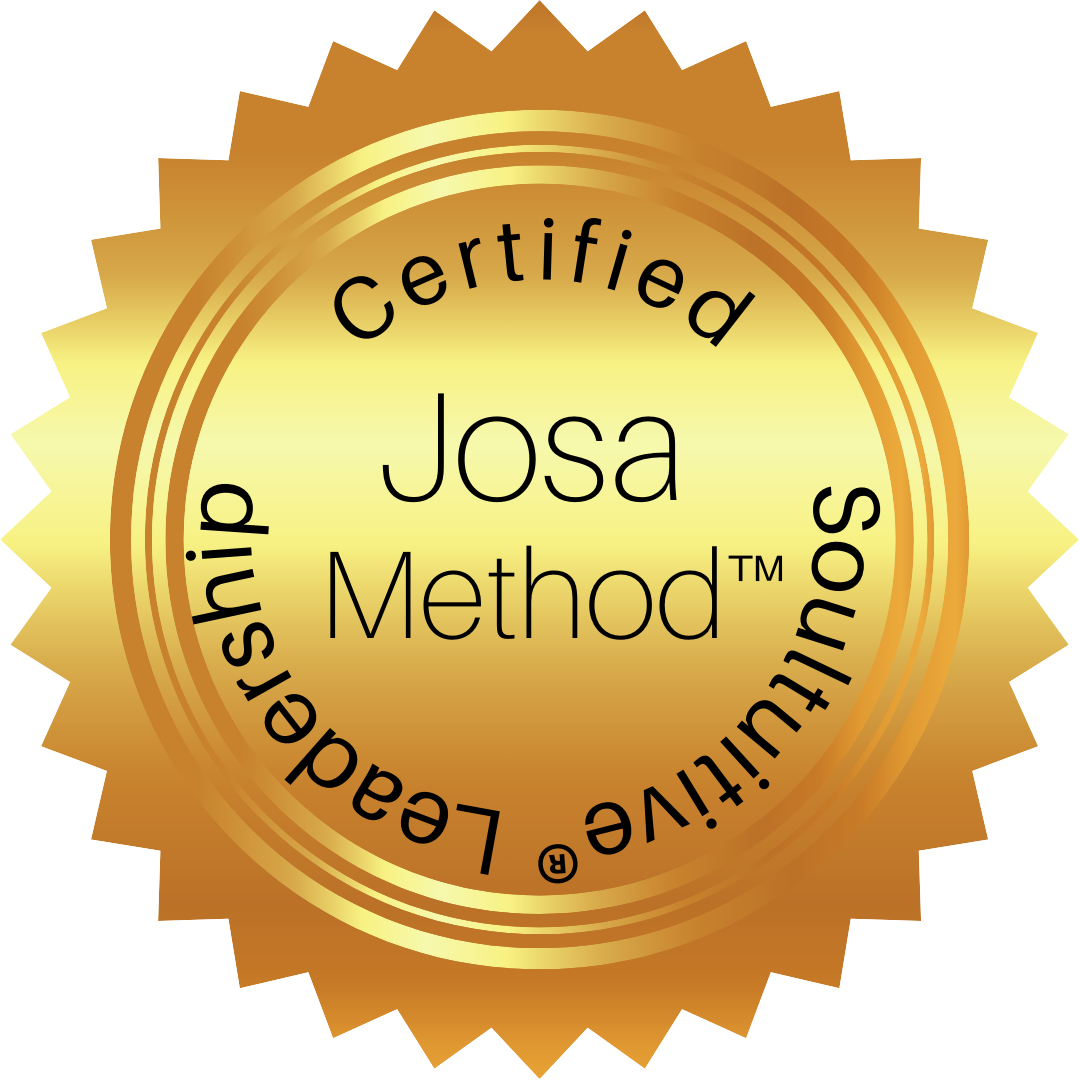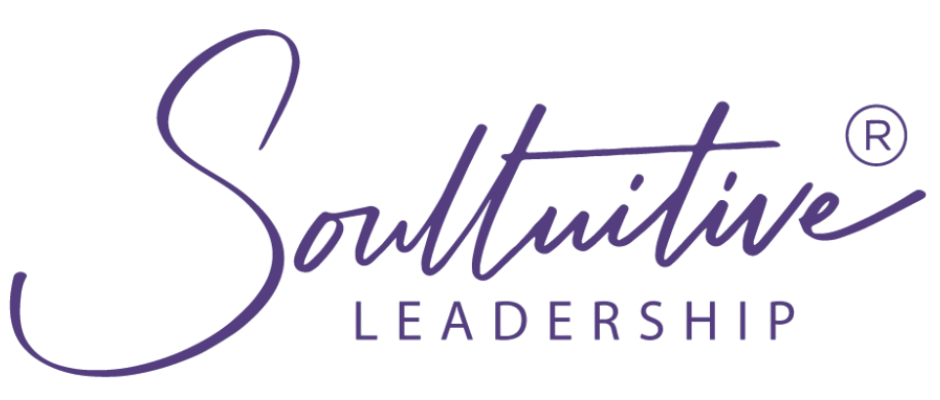If you’re serious about supporting people with Imposter Syndrome safely and effectively, here’s the challenge:
With so much misinformation out there and countless training course options, it’s easy for well-meaning managers to be misled by confident advice that sounds good, from glossy sales pages, but which doesn’t create real change. Sometimes it even risks causing harm.

That’s why, for the past 20+ years, I’ve made it my mission to ensure that anyone who trains with my company on Imposter Syndrome is equipped with evidence-based, ethical, trauma-informed, and truly transformational methods that lead to real, lasting change.
Unfortunately, there are companies out there trying to ride the wave. Some use my company's course and book names. Some mimic our visual branding. Others pass off our research-backed concepts and Imposter Syndrome coaching models as their own ideas. And some people even pretend to have been trained by me, just because they read my books... But this isn't offering you the depth of experience, trauma-informed psychological safety, or the proven results you deserve.
This isn’t just about them using our intellectual property – it's about the wider industry. It’s about protecting you and those you support.
Imposter Syndrome is complex and often trauma-linked. Unfortunately, many programmes in the Imposter Syndrome training space are not designed with the depth, psychological safety, or evidence-based methods needed for safe, lasting transformation.
Concerning trends in this space include:
These approaches are unlikely to equip you with the skills, confidence, or support you need to create safe, lasting transformation.
That’s why we're putting this in writing:
Given the increasing number of imitators out there, as of today, if a programme doesn’t have Josa Method™ Certified on it, then it’s not an authorised use of our work.
The same goes for coaches: if they can't show you they're Josa Method™ Certified, then they haven't been trained in how to safely use our coaching frameworks and tools.
And finally, we're publishing the Josa Method™ Manifesto. It guides you through what to look for in effective, ethical Imposter Syndrome training - and why each of these 12 points is so important - ensuring your investment leads to genuine, lasting results.

You can read the full Josa Method™ Manifesto below.
Let’s raise the standard for integrity and quality in this field.
Clare Josa
Research & Training Director, Soultuitive® Leadership Ltd
The Josa Method™ Manifesto
When you take an Imposter Syndrome coach-type training with us, whether it's for line managers, Practitioners, Master Coaches, or Trainers, we promise it will include all of these twelve elements.
We believe that you and your clients deserve more than just quick fixes and yet more coping strategies that assume Imposter Syndrome is something you’ll have to manage forever. We don't think that's fair, when there are proven ways to truly set yourself free from it - once and for all.
No more lying awake at 3am, worrying if today’s the day someone will find out you’re a fraud or somehow not good enough. No more playing catch-up with the subconscious self-sabotage that's triggered by stuff that 'mindset' doesn't touch.
We go beyond surface-level symptoms, giving you tools to safely and effectively release the deeper, hidden drivers of Imposter Syndrome, so you and your clients can have the impact your ideas and dreams deserve, with courage, confidence, and passion.
You won’t have to go it alone. Forget self-paced self-study (which we all know means never finishing...) or feeling stuck with your only guides being fellow students, who are just as new to this as you... or getting lost and feeling invisible in an online group of 300.
Our approach is built around small-group (20 max), expert-led cohorts, with your inspirational weekly training modules supported by live, expert-led tutorial calls, plus a private forum with our expert tutors, for between-call questions. You’re fully supported every step of the way. You'll have accountability, easily get answers to your questions, and have virtual cheerleading to celebrate your breakthroughs.
You’ll be guided through the main training phase and your case studies by experienced tutors who know exactly how to help you get the most from your training.
With this hands-on support, you’ll never feel lost in the crowd or abandoned to a peer support forum.
We’re with you, helping you shift from information to implementation, so you’re not just learning theory, but building the vital experience that will give you the confidence to go out and support others with what you've been taught.
Forget back-of-beermat brainstormed ideas or asking AI for funky-sounding frameworks – we don’t believe in guessing or relying on random bags of tools. The frameworks and methodologies we teach are rooted in two decades of in-depth research studies, science, neuroscience, psychology, demystified ancient wisdom, and real-world experience.
Plus, they've all been through Clare Josa’s inner Six Sigma Engineer BS filter. So, they're fluff-free and designed to reliably get measurable results for real-world clients.
These aren’t just theoretical ideas. They’re evidence-based, tried-and-tested methods that are proven (yes, with data) to create breakthroughs you'll love.
From start to finish, you’ll be using tools that have been shown to inspire lasting, meaningful change, not just temporary relief. You’ll finish your training with the confidence to use what you have learned to make a difference for others (and you'll have cleared out loads of this stuff for yourself, too!)
Depending which course you're on, you might be learning:
- The Natural Resilience Method® for preventing Imposter Syndrome & burnout
- The HOPE Matrix® for creating cultural change in organisations
- The Rebel RESET™ for kick-starting clients' Rise Like A Rebel® journey and facilitating Women In Leadership masterminds
- Or one of our other proven, research-backed methodologies
The world already has enough quick fixes or sticking plaster solutions for Imposter Syndrome, even though they keep you trapped in the same cycle of secret self-sabotage, perhaps forever.
What we want for you, instead, is real, lasting transformation.
Yes, in-the-moment 'pause' techniques are important, but real, lasting change comes when you release the under-the-surface drivers that allowed Imposter Syndrome to come out to play in the first place.
In our courses, you'll get to go deeper than 'mindset', learning strategies that go beyond masking the symptoms, to clear the hidden causes, throughout the full Imposter Syndrome Iceberg™. You'll learn techniques that work at the cognitive level, and also those that clear the 'muscle memory' of Imposter Syndrome's self-sabotage, including hypervigilance. This combination of techniques is what creates vital shift from 'relief' to 'freedom'!
You'll experience the kind of results that support you to move forward in your career and life with deeper confidence and purpose. This is the kind of transformation that lasts.
By the end of your course, you’ll be empowered to help others do the same – because this isn’t about managing Imposter Syndrome forever, it’s about waving goodbye to it, once and for all. And who wouldn't want that?
You can't take a client to a place your unconscious mind thinks is impossible. And it's tough to be fully present to help a client if your inner dialogue keeps chanting, "Who am I to help them? What if they realise I'm not good enough?!"
So, clearing your own Imposter Syndrome is a crucial first step on your journey towards helping others.
Not only does this help you to be the best coach you can for them, by becoming more of the real you, it subconsciously models to your client that the changes they're dreaming of are possible.
That's why all of our coach training programmes - from line managers to Master Coaches - start with you applying the inspirational strategies you'll be learning for yourself, then we explore how to use them to safely and effectively help others.
Just imagine how different it will feel, once Imposter Syndrome is no longer getting in the way of the difference you want to make, in your life, and in the lives of others!One of the core foundations of coaching is maintaining the crucial boundary between it and therapy or counselling. But the internet is full of well-meaning people sharing techniques that they perhaps experienced for themselves, without realising they are, in fact, specialist, highly-skilled work that should only be led by someone with the right formal qualifications, because of the risk of harm such tools carry.
When you're on a mission to help people, though, it's easy to fall into the 'accidental therapist' trap and try out techniques that go beyond what coaches should be doing.
We're even seeing some employers actively asking staff to do this, hopefully without realising, for example when they tell employees to go and see the in-house Mental Health First-Aiders, if they're feeling stressed and anxious. This turns the MHFAs into untrained, unsupported counsellors and it's a super-bad idea.
The Accidental Therapist trap can also happen when you start unpacking someone's past stories and pain to help them understand their present. When coaching drifts into deep emotional exploration, trying to find things from a client's childhood to explain their present-world Imposter Syndrome self-sabotage and fears, you cross a line - one that could re-trigger long-buried trauma and even a mental health crisis.
Not only does this put clients at risk, but it can take a toll on you, too. Some stories can’t be ‘unheard,’ and carrying that emotional weight isn’t part of your role as a coach.
Psychological safety, consent, and trauma-informed approaches form the foundations of the work we teach.
You'll learn how to guide people safely and effectively, working at the right level to create breakthroughs, without crossing ethical or professional boundaries. And perhaps most importantly, you'll know how to spot the signs that someone needs to be referred on for therapy-type work, before addressing Imposter Syndrome.
Our evidence-based frameworks mean you’ll be able to help clients shift what’s keeping them stuck - without taking on their ‘stuff’ or getting dragged into counselling territory.
No therapy-by-accident. No emotional burnout. No feeling out of your depth. Just proven methods that allow you to create real, lasting change, for your clients and for yourself.
Coaching interventions can feel nebulous. How can you tell if they worked?
That's why the work we teach is underpinned by in-depth research, and this means we've been able to create assessment tools that clients can use at the start and after their work with you, to objectively see the shifts.
Even at just Practitioner level, it's not uncommon for a client's Imposter Syndrome score to drop from 80% (severe) to just 20% (background noise in the questionnaire) in just 12 weeks.
That's an incredible level of breakthrough.
Plus techniques in the programmes, such as MicroWins, and the Imposter Syndrome Hacks™ App's virtual journal, support clients in spotting their shifts as they go through, celebrating each one, reinforcing the changes they're making, helping them to stay motivated, and prompting even bigger breakthroughs.
And if you're working with us on a scalable solution for your organisation, we can carry out a research study before and afterwards, to give you data that will help your CFO see that this was possibly the best investment they've made all year.
We even have a research-backed cost calculator you can use to assess how much Imposter Syndrome might be costing your organisation - in cold, hard cash - and how long solutions would take to pay back. Spoiler alert: sometimes it's just days.
When you’re helping someone make deep, lasting changes, psychological safety isn’t a nice-to-have - it’s non-negotiable. But it doesn't happen by accident. It needs to be designed into the processes.
Without it, coaching can do more harm than good. And that’s especially true when it comes to Imposter Syndrome, because it’s so often rooted in micro-trauma from the past - experiences that might seem small on the surface but have shaped someone’s deepest fears about not being ‘good enough'.
Psychological safety means someone feels safe enough to explore change, without fear of judgment, failure, or consequences. It’s what allows clients to be honest with themselves and with you, without shutting down, putting up a front, or saying what they think you want to hear.
Trauma-informed means you're only using tools that keep clients safe, and protect them from falling into the Accidental Therapist trap we talked about in #4.
But here’s the catch: if psychological safety isn’t there, or a tool treads on the toes of past pain, the brain goes into self-protection mode. That means your client gets stuck in the fight, flight, freeze, fawn response, making creating real change impossible. The client will subconsciously use 'resistance' or 'shutting down' to protect themselves. It’s why so many ‘breakthrough’ techniques fail, leaving people feeling worse instead of better.
In a workplace setting, this is even more critical. If someone doesn’t feel safe, they won’t admit to struggling. They’ll nod along, make the right noises, and leave your session just as stuck as before, only now, they feel even more isolated. This is especially important in HR, where the colleague you're coaching knows your teammates make decisions about everything from promotions to redundancies.
And for you as a coach? Without psychological safety, you risk unknowingly re-triggering someone's suppressed trauma, damaging trust, or even opening up issues you’re not trained to handle - not just in your client, but also for yourself.
That’s why psychological safety and trauma-informed approaches underpin everything we teach.
You’ll understand the hidden signals that show when someone is reaching their emotional edge - so you can guide them forward without pushing too far. And you’ll be equipped to recognise when something is outside your professional remit, so you can refer a client on and avoid accidentally taking on the role of therapist.
This isn’t about playing it safe or watering things down. It’s about doing the work at the right depth, in the right way, so that every breakthrough is built on a foundation of trust, safety, and real, lasting change.
Yes, we know... we all hate audience participation on courses. The forced icebreakers, cringy role plays, and "share your thoughts" prompts that just make you want to disappear. But when it comes to growing as a coach, theory isn't enough – it’s about learning how to apply it.
Theory can sound great on paper. You can rattle off all the right terms, quote the experts, and nod along to every training module. But you're unlikely to implement your new information. Unless you put that knowledge into action, it’s just a bunch of nice ideas.
What happens when you show up for your first real-world client session, if your course stopped at just the 'theory' stage? If you're like most of us, you'll freeze and fall back on the techniques you were comfortable with before the course. That certificate you got for watching a few videos? It doesn't help when you need it.
Not even training videos with simulated client sessions give you what you need, because watching an expert do it doesn't build your own confidence.
Real expertise comes from putting theory into practice, to create real results for real clients. It’s about understanding the nuances of each individual's situation and having the confidence to adapt your approach to get them the best outcome.
That’s why we don’t abandon you once you’ve completed the initial training.
We keep walking by your side throughout your case studies. You’ll get expert support from expert tutors, and even from Clare Josa, as you apply what you’ve been learning to real-world clients, not just coaching swaps with fellow students.
And not only does this help with your first few clients, but you also learn from others’ case study experiences. So by the end of that phase, you’ll have vicariously coached 50 or 100+ people – even if you only worked with a handful of clients yourself.
Yes, it would be cheaper and easier for us to cut you adrift after the training modules. But we don’t think that’s fair.
Instead, we want to support you as you learn how to read between the lines with Imposter Syndrome, to spot hidden patterns, and to apply your knowledge to real-life situations. You’ll develop the skills to guide clients through challenges, knowing when to pivot, persist, or hold space.
No more regurgitating theory. You'll have practical expertise that helps you have a much deeper impact.
PS Our grads tell us that they love looking back at how much they grew as a coach between their first and final case study. They often describe it as 'unbelievable' and rave about how it sky-rocketed their confidence. We want that for you, too.
Did you know we created the world's first app specifically designed to help people set themselves free from Imposter Syndrome? It's called Imposter Syndrome Hacks™.
And if you're on one of our coach training programmes - whether that's at foundation level or moving towards mastery - you'll get a special discounted rate for the app, to share with clients and colleagues, to support them in making faster, deeper changes while they're working with you.
Just imagine being able to give them 'homework' of watching a short course in the app, or practising a certain technique each day, or celebrating their MicroWins in the virtual journal - and how that will influence the shifts they'll have created before your next session?
The app helps to reinforce what you're doing with your coaching, and gives clients practical things they can do between sessions to increase the impact of your work.
And if you're certified to support clients with our Imposter Syndrome Bootcamp™ or Stepping Up To Lead trainings, you can give your clients access to the 'private podcast' for that level of course inside the app, meaning they've always got an audio to guide them through their current technique.
This makes it easier for them to practise, and over the past years of doing this, it has been shown to get them deeper, faster results, because they're making more progress between sessions.
It's like them having a mentor in their pocket, on their phone, and it means that in your coaching sessions you can focus on the strategies that have more impact, because the app is helping them to lay the foundations.
We shouldn't have to say this, but recent trends in the industry mean we do:
Ethics and integrity are non-negotiables in coaching. If you're looking to take shortcuts or bend the rules, our courses aren't the right path for you. But if you’re committed to doing the right thing, even when no one’s watching, then you're in the right place.
Coaching is a privilege. You're not just helping people achieve their goals; you're guiding them through some of the most personal and transformative moments of their lives. That’s why we build ethics and integrity into everything we do – not as an afterthought or a once-and-done add-on module, but as the foundation of everything we teach.
From managing client boundaries to holding space for deep work, and even knowing when to refer someone to another professional, integrity should guide every decision. It's about being transparent, honest, and staying true to the trust your clients place in you.
But it's not just about them: it's about you. Ethics and integrity are one of the reasons why all of our coach-type training courses start with you doing this work for yourself, before learning how to support others with it. After all, if a coach is crippled by Imposter Syndrome, it's hard for them to congruently support a client in setting themselves free from it.
And it’s about being ethical in the business side, too – pricing your services fairly, marketing with honesty and without using fear as a sales strategy, and never promising what you can’t deliver.
If you’re using tools and strategies that don't honour those values, you might see short-term wins, but you'll sacrifice long-term trust and success. And let’s be real – without trust, the whole coaching process falls apart.
When you’re grounded in ethics and integrity, you’ll be able to make confident decisions, offer the best service, and build a reputation that lasts as being a great coach who helps clients to achieve results they never imagined were possible. And that’s the kind of success that matters.
The real learning starts once your training ends. And that's why post-course support is so important. It sets you up for long-term success.
Once you've completed your certification with us, you'll be eligible for grad membership. This means:
- You’ll have access to CPD (Continuing Professional Development), ensuring you can keep evolving your practice and stay on top of the latest techniques. You’ll also get ongoing access to your training materials, including updates and grads-only masterclasses, for as long as you want to stay a grad member.
- You are not alone! Finding your tribe is essential. Connecting with other coaches who are on a similar journey means you can get answers to your questions, celebrate your successes with people who truly 'get' it, and get advice on client 'foibles' when you need it. You don’t have to figure it out alone.
- Coaching supervision is part of the membership too. It’s a space to reflect, develop your skills, and keep growing as a coach, whilst also learning from your fellow grad coaches in the process.
This ongoing support makes a real difference – not just in how you work, but in the impact you have with your clients. When you feel fully supported, you can do your best work.
Who are you looking to help with ditching Imposter Syndrome?

Help for yourself
Looking for solutions to clear your own Imposter Syndrome? You'll find plenty of inspiration here:

Help yourself & others
Want to learn how to help others to clear Imposter Syndrome, as well as clearing your own?

Support your teams
Curious about scalable solutions that can help hundreds, for the cost of coaching a handful?
